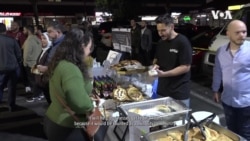((PKG)) LITTLE ARABIA
((TRT: 04:44))
((Topic Banner: Little Arabia))
((Reporter/Producer/Camera/Editor: Genia Dulot))
((Map: Anaheim, California))
((Main characters: 1 female; 3 male))
((Blurb: This Area in Anaheim Has Been A Popular Destination for Arab-Americans In The Last 30 Years))
((NATS))
((Aladdin Khouraki
Owner, Altayebat Market))
My mom and my dad originated from Syria in the 60s. My father came here. He studied here. He opened up a small business off of Cerritos and then slowly that business grew.
It’s definitely boomed in the last 30 years that it wasn’t really anything when we first opened here. When I was a kid, it was nothing, and now it’s bunch of restaurants and other stores and clothing stores. It became a destination because people longed for what their family used to cook back home. Our meat section is probably the biggest department that we have here. A lot of people come just to buy our meat because it’s halal [meat prepared as prescribed by Muslim law]. So they would be looking for specific types of food, that they didn’t have in regular American grocery stores.
It’s nice to be recognized, when it…when something has been here so long, when the community has grown. It’s like Little Saigon or Little Korea, all those…just like those are recognized, I think it’s important that we’re recognized, or this area is recognized as Little Arabia.
((Kareem Hawari
Owner, Kareem’s Falafel))
I think the designation is really good for our community so that we can all start to highlight our businesses as opposed to just kind of being under the cover of Disneyland and Angel Stadium and all the things we’re known for here.
Now finally, we have an outlet for our own cultures and traditions, and people can start to recognize us and not just be another business in Anaheim.
My parents, they came from Palestine. They opened one of the first restaurants in Brookhurst. We’ve been here for 27 years, and we serve authentic Mediterranean food. So the falafel that we make is very authentic because it has a lot of parsley. A lot of people in the Middle East, they usually put more parsley. That’s the Palestinian way. Egyptians, they use fava beans, so it’s less green.
Now we have, there’s so many immigrants over the past 10 years here, from students from Saudi Arabia to children from Syria, they’ve all come here to like start a new life, grow their futures, education system here. It’s a big melting pot of cultures even within the Arab community.
Everybody has like their own way of serving Arabic food. My mom, when she takes orders, she’ll say, ‘Where are you from? Are you from Syria? Are you from Lebanon? Are you from Egypt?’ Then she changes her whole dialect. Now she’s speaking Egyptian Arabic, Okay, now she’s the next customer, Syrian. Now she’s speaking the Syrian dialect.
((NATS))
((Rashad Al-Dabbah
Executive Director, Arab American Council))
We kept pushing for two decades, two decades of hard work, to get this designation. We’ve spoken to 13 council members and three mayors over two decades to finally get this designation done.
((Reporter))
How many Arabs American currently live here?
((Rashad Al-Dabbah
Executive Director, Arab American Council))
That’s a good question. The estimate is in Orange County, it’s close to 90,000, but we don’t have accurate number. And the reason we don’t have accurate numbers is because, in the census, we are counted under Whites, and that needs to change.
Having accurate numbers, having accurate data will also help us track civil rights abuses against the community. It will help businesses get federal loans because it would be counted as a minority community. But being lumped under Whites means that we are invisible, and we don’t want to be invisible. So to us, it’s symbolic, and it’s going to bring a lot of economic benefits and cultural benefits to us.
((Manal Saad
Anaheim Resident))
I am Lebanese American. My parents were born and raised in Lebanon and then came here and had me and my siblings. So I grew up here, but I go to Lebanon often. So I consider myself Arab American. Maybe because I wear a scarf, or I more, by my looks, identify as an Arab, now it gives people like, ‘Okay, I know more about her.’ And not just religion, but more about culture, which I feel like is important because when people look at me, they only see religion. So, as a woman and because I look like that, now people know more about me and my culture.
((NATS: Crowd singing))
Give love. Give love, y'all.
One love. It's one love, y'all.
Show love. Show love, y'all.
Show love. Show love, y'all.
Give love. Give love, y'all.
One love. It's one love, y'all.
Show love. Show love, y'all.











